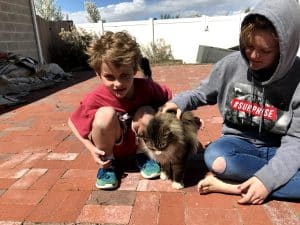
As we start experiencing shorter days and longer nights this time of year, I am reminded of depression.
Almost exactly twelve years ago, I was driving home to our apartment with my screaming ten-month-old in the car seat. I had a troubling and false belief that I couldn’t comfort my own flesh and blood, and had the distinct thought, “My boys will be better off without me.” I daydreamed about leaving my family and driving far far away.
These feelings of inadequacy and depression came during a difficult year as a first-time mom. My son was born with a bowel disease and needed two very invasive surgeries–one when he was five days old (story told here), and another when he was eight months old. The first surgery was to place a colostomy.
The second surgery was to remove the colostomy, reroute his intestines and eradicate the parts of his large intestine that were missing the nerve endings needed to move his stool to his rectum. This was a five-hour surgery and the post-surgical care involved making saline, lubing a catheter, and giving him an enema. We had to pin him down to do this, and it was traumatizing for all involved. We had to do it every day for almost two years, or risk him getting enterocolitis. He needed diaper changes upwards of 15 times a day for those first couple months, including through the night. We were sleep-deprived first-time parents worried for our baby. It was the most challenging time of my life–wanting to help and heal my baby but feeling like I couldn’t even comfort him as his mom. I knew he was in immense pain.
So, it was around that time that my thoughts of leaving my husband and baby came. I called my Obstetrician’s office, asked to speak with a nurse, and could barely get the words out of my mouth, “I am worried that I’m not okay. I think I have postpartum depression. I need help.”
“How old is your baby?”
“Ten months.”
“Oh, we can’t help you here. Call your doctor.”
She may have said something else, but I don’t remember anything registering.
With a lot of courage, I searched for a primary care physician in the area, got an appointment, and admittedly, with a dose of shame, I started the medication Citalopram (Celexa). After about a month, the medication did its job– it took the edge off, and the intrusive thoughts went away.
A couple of months later, I visited my parents out of state with my now one-year-old. I was really nervous and told my parents that I had gotten on much-needed medication to help with my recent challenges, and one of my parents exclaimed, “You don’t need medication! If you just exercise, read your scriptures, eat healthy and pray then you won’t need to be on it!”
At the time, their reaction absolutely devastated me. I was, indeed, exercising, reading scriptures, eating (mostly) healthy and praying my heart out.
Here are some falsehoods that existed in my world at that time:
- Righteousness is tied to happiness. Wickedness never was happiness (Alma 41: 10-11).
- Therapy and medication are for weak people. This was my outlook on mental health–only people who are not disciplined and who are probably making bad choices will struggle with their mental health.
- If you are feeling depressed, then it’s your own fault and you need to take action, talk to Heavenly Father more, and examine your life for things you need to repent of.
- If you are grateful and express that gratitude, then you won’t be depressed.
These ideals were ingrained in me, and I absolutely judged others for having any mental health struggles. So, this response from a parent broke my heart but also did not surprise me. Today my heart goes out to anyone who was raised that way. Being raised with those ideals is potentially very harmful. Is there some truth to those statements? Absolutely. But if I had let those mindsets on medication rule my life, I worry about where I would be today.
Elder Holland’s talk “Like A Broken Vessel” in 2013 was groundbreaking. That General Conference talk gave members of the church permission to start seeing depression, anxiety, and other mental health issues as conditions to be treated and talked about versus my default reaction–to suffer in silence and feel ashamed and unworthy. Now, the church offers several mental health education resources and even emotional resiliency classes.
Many have situational depression or Seasonal Affective Disorder and perhaps can wean off of medication eventually. Others depend on medication just to get through each day. Women have hormonal challenges through menstruation, pregnancy, postpartum, perimenopause and menopause that include mental health difficulties. I have tried going off of my medication a few times through the years, and have always come back to it. I feel more like myself when I am on it. I am so incredibly grateful for the decreased stigma associated with depression and anxiety since the year 2012. And as it turned out, this parent got on the same medication that I did shortly after that conversation. I hope that with my vulnerability and openness in sharing my struggles and getting on medication they could find the courage to do the same. And I hope the same for any of you.
I am curious–did any of you grow up with those same inaccurate and harmful ideals in your family or church circles? Have you felt any shame for having depression/anxiety?






3 Responses
A comment was made in my relief society recently that all negative feelings come from satan. No one challenged this idea and the teacher even referenced it later in the lesson (To need fair, I didn’t offer another viewpoint. This was in part related to the challenges of being almost the only one who will speak up).
We all experience blind spots, usually in the area that we have no problems with. Once we live through a particular adversity, we become more sensitive to the issue in our own and other’s lives. Depression, financial lack, family problems, unemployment all take on a new perspective with experience. I would be a much better bishop now after my life experiences, but it would s a duty I would never seek.
What a beautiful post. Thank you for sharing. I’ve watched young mothers I love suffer from depression and we didn’t have language or resources or understanding about what was happening to them and then the resulting shame of “what is wrong with me?” And “I’m a terrible mother” — until now! Also, growing up, my mom suffered from clinical depression but never received medical help or medication until after I left the house. I’m so so glad that culture and society is changing and becoming more informed about the real and often invisible suffering of women, mothers, and people with mental illness.🤍🤍 Thanks for sharing your experience. This is how we continue to change our culture!